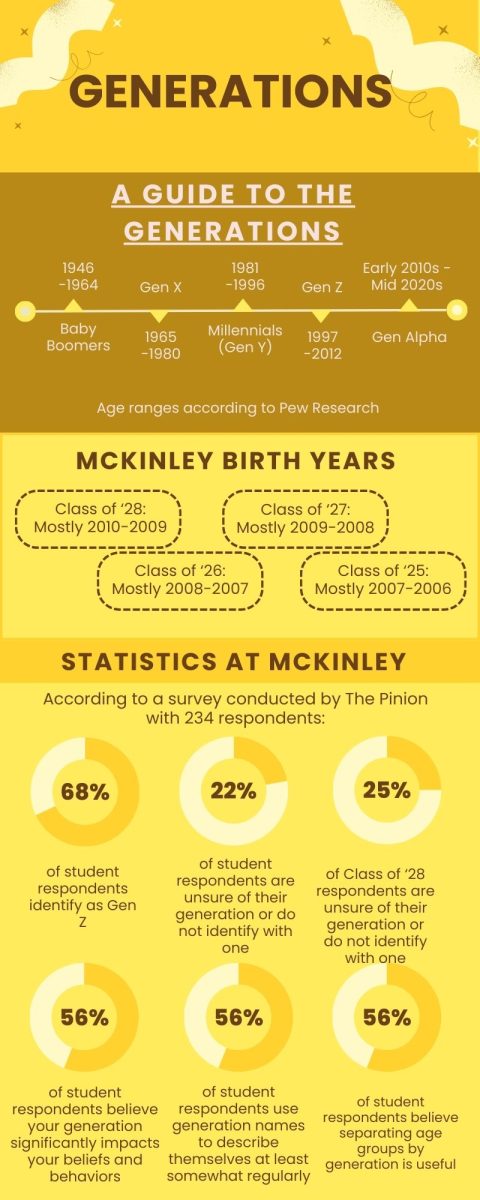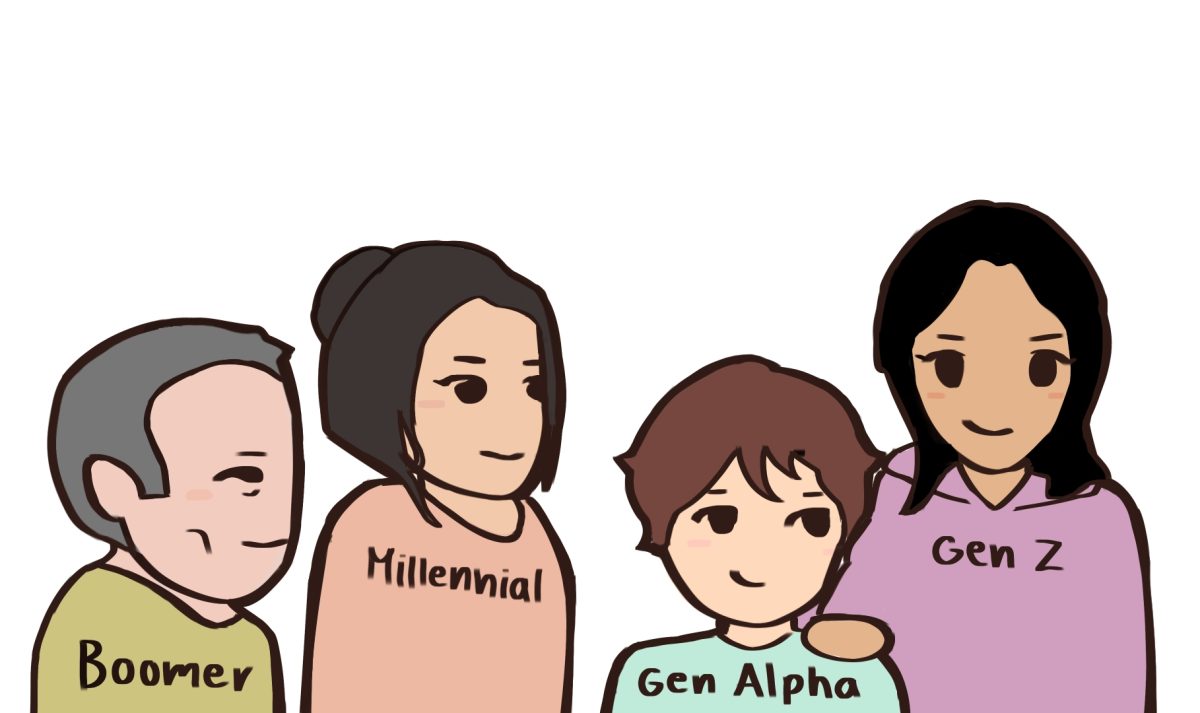Most students in this year’s freshman class, the Class of 2028, were born in 2010. This means they are the first class year with students that could be considered Gen Alpha. However, according to a survey conducted by The Pinion, about a quarter of respondents who are part of the Class of 2028 are unsure of their generation or do not identify with one. In the general student body, 22% of respondents felt the same.
This survey indicates it’s quite common for McKinley students to be unsure of their generation, and this is for good reason. Since there is no consensus on when exactly Gen Z ends and Gen Alpha starts, it’s difficult to decide which generation you belong in, especially if you’re born in 2010 like many of this year’s freshmen. Gen Alpha, the youngest generation alive at the moment, does not yet have a universally agreed upon starting or ending year.
One of the most commonly used starting dates is 2010, used by McCrindle Research, whose founder Mark McCrindle coined the term “Generation Alpha.” This starting date would mean that many students belonging to the Class of 2028 are the oldest members of Gen Alpha. However, this causes an overlap with the commonly used ending date of 2012 for Gen Z, so it might make sense to use 2013 as the first year of Gen Alpha instead. As for Gen Alpha’s exact ending year, McCrindle has set it as 2024, though 2025 seems to be somewhat more widely used.
But the more important question is: does the generation you’re born into really matter?

Generations and Their Use
In their 1991 book “Generations,” the generational theorists Neil Howe and William Strauss, credited with designating most of the 20th-century generations we use today, define a generation as an age cohort that has experienced the same major experiences during roughly the same life stage, in which the members share “perceived membership” and common “beliefs and behaviors” as a result of their formative events. In summary, this means the people in a generation are those who were shaped by important events during similar times in their lives.
Britannica cites some of Gen Z’s defining events as the Great Recession of 2007-2009, the creation of the iPhone in 2007, and the COVID-19 pandemic, as well as Barack Obama’s presidency from 2009 to 2017 and the legalization of same-sex marriage in 2015. These events can explain Gen Z’s positive traits of technological familiarity and value for diversity as also noted by Britannica but also its relative pessimism compared to other generations.
Gen Alpha has also been affected by the pandemic, perhaps more so than Gen Z because of the amount of their lives spent in the COVID and post-COVID world. They lack memory of most of Gen Z’s defining events, and the 2016 election between Hillary Clinton and Donald Trump may be the earliest election most Gen Alpha have a memory of. However, since Gen Alpha is still a young generation with some years to go before they enter adulthood, it’s hard to know how these events will shape it, and it has yet to develop an identity separate from that of Gen Z. This means that it’s not yet known specifically how Gen Alpha is different from Gen Z, especially the younger part of Gen Z who may also lack memory of many of its landmark events.
Also, as the sociologist Karl Mannheim has noted in his studies of social generations such as his 1928 paper “The Sociological Problem of Generations” (“Das Problem der Generationen”), it’s not possible to group everyone into a generation simply based on their year of birth. Mannheim stated that factors such as the country one lives in as well as their social status can mean very different experiences within the same age cohort. Nevertheless, generations are generally useful in statistics to record social progress, and are often used today to study the social impacts of significant events in history and how people in a country or the Western world change over time.
Generations and Stereotypes
As the use of generation names has become popularized over time, it’s become quite common to see people use them to describe themselves and others, especially online. When I talked to two McKinley staff, one said they were born in between generations and felt people couldn’t be categorized based on their generation. The other, who said they were a millennial, felt they are important because people are products of their upbringing. A student I talked to believed that Gen Alpha was online more than Gen Z was, while another said they did not yet see much of a difference between the two generations.
This also means that it’s become more widespread to attach negative stereotypes to those who belong in another generation. I have seen that when people express that they are unsure whether they belong in Gen Z or Gen Alpha, part of their concern is caused because they don’t want to be associated with the “brain-rotted” or screen-addicted perceptions of Gen Alpha by older generations. But the irony in older Gen Z assigning these stereotypes to Gen Alpha is that many of the negative typecasts they assign to Gen Alpha are very similar to those that have been placed on Gen Z, such as over-dependence on technology and having a short attention span.
Generations and Identity
Those who were born on the cusp between two generations like the Class of 2028 might feel the desire to be able to confidently identify with one of them. This is an understandable desire, considering that one of Howe’s and Strauss’s criteria for a generation is a shared sense of membership. Those born near the cut-off of Gen Z and Gen Alpha may not feel entirely part of either generation–and that’s okay. Generations are based on shared experiences and beliefs, which means people born on the edge can choose to identify or not identify with either generation based on how much personal influence a generation or event has had on them. Even though many students in the Class of 2028 are born in 2010 and could possibly be considered Gen Alpha, only 8% of survey respondents in the freshman class actually feel they are one, with 62% instead identifying as Gen Z, most likely because of the effect Gen Z culture has had on their identity. Also, generations are constantly evolving and being redefined, which means Gen Z and Gen Alpha could even eventually get merged.
All in all, generations can be useful tools for understanding how people are shaped and change over time, but they are imprecise, and they don’t account for all the ways people who are born in a certain range of years can be drastically different. Placing less individual significance on the generation someone was born in and ending the cycle of harmful stereotypes will help create a future where everyone can work together and create a better world for all.










